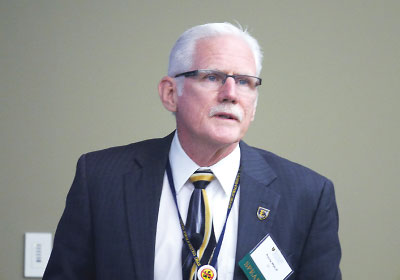The Appalachian mountain region has a distinctive beauty and culture as well as a unique—and uniquely tortured—history that has shaped its society over the centuries and impacted the health and mental health of the people who live there.
That was the message of psychiatrists and mental health professionals who met for a two-day conference in October in Johnson City, Tenn., in the heart of Appalachia, sponsored by APA’s Division of Diversity and Health Equity (DDHE). APA’s partners in sponsoring the first day of the conference, titled “Promoting Mental Health in Appalachia,” were Eastern Tennessee State University (ETSU), the University of Virginia, George Washington University, and Healthy Appalachia. The second day of the conference, titled “Psychiatry in the Mountains,” was sponsored by ETSU.
“This program focused on some of the most underserved and underaccessed U.S. populations,” said Ranna Parekh, M.D., M.P.H., director of DDHE. “Our goal was to convene stakeholders to recognize Central Appalachian’s mental health challenges and begin to develop strategies to fight stigma and improve access to care.”
In opening remarks at the conference, APA President Altha Stewart, M.D., noted that although she comes from Memphis, on the other side of the state, many of the problems confronting the Appalachian region—poverty, lack of education, and a history of economic trauma—are similar to those faced by urban communities of color, including a shortage of mental health professionals (see sidebar).
“Poverty begins a process that ends up in poor health,” Stewart said. “Rural America has unique challenges that will have to be dealt with uniquely.”
She argued for what she called “place-based care,” informed by a deep understanding of the history, geography, and culture of a specific location and how that culture shapes the social determinants of health and ultimately determines health outcomes. (The social determinants of health include factors such as education, employment and economic status, the safety of the neighborhood in which one lives, availability of healthy food, and access to health care).
“I hope our collaboration and attention to the social determinants of health in Appalachia will bode well for the populations we serve,” she said.
Psychiatrists and mental health professionals who work in central Appalachia described a distinctive and resilient social structure: close-knit families that have occupied the same geography for generations, united by a common history in a strikingly beautiful landscape and a culture that emphasizes family over the individual as the core of identity.
They also described a region that has been economically traumatized over many generations. Poverty and lack of education have in turn negatively affected physical health and mental health in the region: people in the central Appalachian counties die earlier and have higher rates of smoking, diabetes, depression, deaths by suicide, and deaths from opioid overdoses compared with the general population.
“This is a region that was literally raped by coal and lumber companies while the rest of the country stood by and did nothing,” said James Griffith, M.D., chair of the Department of Psychiatry at George Washington University. “And the people of the region know it.”
Griffith, who grew up in Appalachia, is internationally known for advancing “resilience-based therapy” for traumatized populations. He delivered the 2017 Oskar Pfister Award Lecture at APA’s 2017 IPS: The Mental Health Services Conference in New Orleans during which he described his work developing brief-intervention modules that help patients practice hope in demoralizing life situations (
Psychiatric News, November 15, 2017).
Griffith said that the history of Appalachia is such that many in the region are distrustful of outsiders, including those who come with good intentions to help.
“Coming in as uninvited outsiders, how do you approach a people whose history is one of betrayal and neglect?” Griffith asked. “Whether between couple partners, between a worker and an employer, or between Appalachia and the rest of the country, it can be difficult to re-establish trust after one feels betrayed by the other.
“Aiding Appalachia may need to start first with restoring broken trust,” he continued. “Honoring the struggle of Appalachia is a first step, in my opinion, to beginning a conversation in which it then becomes possible to collaborate to address problems of suicide, depression, and opioid abuse.”
Education Drives Health Behavior
In a presentation on the social determinants of health in Appalachia, Randy Wykoff, M.D., dean of ETSU, noted that the rate of premature death (defined as dying before age 65) in central Appalachian counties is 28 percent higher than the rest of the United States. Of the five factors affecting premature death—genetics, environment, social circumstances, access to health care, and behavioral factors—access to health care accounts for only 10 percent.
The largest driver of premature death is behavior, especially tobacco smoking and substance use. Wykoff also noted that the rate of drug overdose deaths in central Appalachian counties is 66 percent higher than the national rate. “Our worst counties are much worse than the worst counties in the rest of the country,” he said. “The epicenter is right here in Central Appalachia.”
He said the region has been especially blighted by the epidemic in part because of the large number of disabled miners who were prescribed prescription opioids early on.
Wykoff emphasized that sustainable change in health outcomes in Appalachia requires attention to addressing the social determinants of health—especially education, employment, and poverty. He advocated for public health workers to collaborate with educators and employers, including unconventional partners such as local chambers of commerce, to improve the health of the region’s residents.
“We need to work together to encourage healthier behaviors, especially related to tobacco, diet, exercise, and substance abuse,” Wykoff said. “We need to work together to enhance economic opportunity and improve educational achievement.”
Richard Merkel Jr., M.D., Ph.D., a professor and director of outreach in the Department of Psychiatry and Neurobehavioral Sciences at the University of Virginia, said the attention of APA and its partners in focusing on the mental health needs of Appalachians is an encouragement to mental health workers in the region.
“The stigmatization of people from Appalachia is painful and demoralizing,” he said. “Often providers and advocates in this area feel alone and often overwhelmed by the difficulties that they face. Because of this conference, there is an increased sense of not being alone and a renewed hope that there can be a larger, more combined effort to address these often-unacknowledged needs.”
The planning committee for the conference included Merkel; Myra Elder, Ph.D., psychology training director at the James H. Quillen Veterans Administration Medical Center Mountain Home; James Werth, Ph.D., behavioral health and wellness services director at Stone Mountain Health Services; and Theressa Buriss, Ph.D., director of the Appalachian Regional and Rural Studies Center at Radford University. ■


